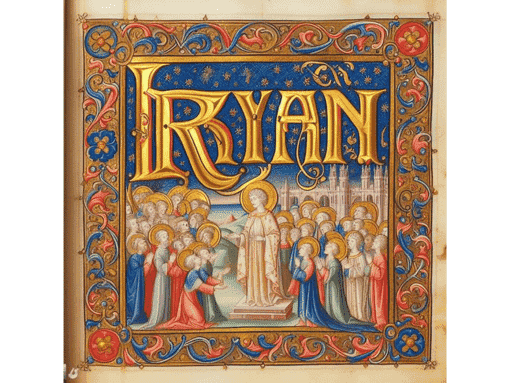The name Ryan conjures images of strength, leadership, and nobility. Despite its popularity today, Ryan’s roots stem from ancient Hebrew and Gaelic languages, where it carries deep spiritual symbolism. While the name Ryan does not appear verbatim in the Bible, it relates to several prominent biblical figures that exemplified courage, vision and devotion to God.
In this analysis, we will explore the biblical significance, interpretation and spiritual meaning behind the popular name Ryan.
The Origin of the Name Ryan

The name Ryan is of Irish and Gaelic origin, derived from the old Irish name “Rian.” Rian means “little king” or “kingly,” and is believed to have been popularized during the Middle Ages in Ireland and Scotland.
However, the name Ryan also has a connection to biblical traditions. According to some sources, Ryan is derived from the Hebrew name “Reuben.” Reuben was one of the twelve sons of Jacob in the Old Testament, and his name means “see, a son.” The name Reuben symbolizes vision, insight, and prophecy.
Another theory suggests that Ryan has roots in the name “Aaron,” the brother of Moses in the Bible. Aaron was the first high priest of Israel and is known for his loyalty and devotion to God. The name Aaron means “mountain of strength” in Hebrew, and is associated with power, courage, and leadership.
| Origin | Meaning | Symbolism |
|---|---|---|
| Irish/Gaelic | “Little king” or “kingly” | Royalty and nobility |
| Hebrew | “See, a son” or “mountain of strength” | Vision, insight, prophecy, power, courage, and leadership |
The biblical origins of the name Ryan add a deeper spiritual significance to this popular name. Whether it is derived from the name Reuben or Aaron, Ryan is associated with noble qualities such as loyalty, devotion, and strength. These biblical roots have influenced the meaning and symbolism of the name Ryan for centuries, across various cultures and traditions.
Spiritual Significance of Ryan
The name Ryan holds significant spiritual significance in Christianity, embodying various biblical values and beliefs. In the religious context, Ryan represents a strong and upright individual who adheres to the teachings of Jesus Christ.
According to Christian beliefs, the name Ryan means “little king” or “illustrious,” symbolizing one who is destined for greatness. It is believed that individuals who carry this name possess an inherent sense of leadership, strength, and courage, which are essential traits for a devout follower of Christ.

The spiritual significance of Ryan also extends to the name’s association with the archangel Raphael, who is considered a prominent figure in Christian mythology. Raphael is known for his healing abilities and is often associated with the idea of spiritual renewal and rejuvenation. As such, the name Ryan is also associated with healing, compassion, and the power of prayer.
Furthermore, Ryan is believed to represent the qualities of loyalty, kindness, and generosity, all of which are essential to living a life of faith and righteousness. In Christianity, these values are considered integral to one’s spiritual growth and are often associated with the idea of loving one’s neighbor.
In summary, the name Ryan holds significant spiritual symbolism in Christianity, representing various values and beliefs that are essential to the faith. Its association with Raphael and its connotation of leadership, strength, and compassion make it a name of profound significance in the religious context.
Biblical Interpretation of Ryan
One interpretation of the name Ryan is “little king,” derived from the Gaelic word “Ri,” meaning “king.” In the Bible, kings hold great power and authority, representing both the strength and responsibility that comes with leadership. This interpretation suggests that those with the name Ryan may possess natural leadership qualities and have the potential to make a great impact in the world.
Another interpretation of the name Ryan relates to the idea of “ascending” or “rising.” This interpretation is based on the Hebrew word “Raan,” which means “to rise up.” In a biblical context, rising up can represent a spiritual ascent, moving closer to God and achieving a higher level of consciousness. Those with the name Ryan may be seen as individuals who are on a spiritual journey, seeking to grow and evolve in their relationship with God.
The symbolism associated with the name Ryan in the Bible is also crucial to understanding its biblical interpretation. The color purple, for example, is often associated with royalty and leadership. In the Bible, purple was worn by kings and high priests, representing their status and authority. This color is often linked to the name Ryan, emphasizing the idea of kingly leadership and spiritual ascension.
Overall, the biblical interpretation of the name Ryan reveals a deep connection to spiritual growth and leadership. It suggests that those with this name may possess natural leadership qualities and have the potential to make a significant impact in the world, both in their relationships with others and in their relationship with God.
Symbolism of the Name Ryan
In Christianity, the name Ryan is associated with spiritual values such as hope, faith, and love. These themes are reflected in the symbolism attributed to the name Ryan.
In the Bible, the name Ryan is often considered a symbol of strength and courage. This is evident in the story of Moses, where he sends 12 spies, including a man named Ryan, to explore the land of Canaan. Ryan joins Joshua, the other spy who displays courage and faith, in urging the Israelites to trust in God and conquer the promised land.
The name Ryan also holds symbolic significance in the context of Christian faith. It is associated with the virtue of perseverance, reflecting the biblical teachings of endurance and steadfastness in the face of adversity. This quality is exemplified in the life of Saint Ryan of Tours, a fourth-century bishop renowned for his compassion and unwavering devotion to God.

Overall, the biblical symbolism of the name Ryan represents a powerful message of hope and perseverance in the face of hardship. Its deep spiritual connotations are a testament to the enduring influence of biblical traditions on contemporary religious beliefs and practices.
Ryan’s Biblical Significance
As we have seen, the name Ryan has a rich biblical meaning. But what is its broader significance in the context of the Bible?
While the name Ryan does not appear specifically in the Bible, it is closely related to the name Reuben. In fact, Ryan is a modern variant of the original Hebrew name Reuben, which means “behold, a son” or “see, a son.” Reuben was one of the twelve sons of Jacob, who became the patriarch of the tribe of Reuben.
Throughout the Bible, the theme of fatherhood and sonship is central to many stories and teachings. The relationship between God the Father and Jesus the Son is perhaps the most significant example of this, as it underpins the entire Christian faith. Thus, the name Ryan, with its association to the son of Jacob, can be seen as symbolizing the relationship between God and humanity as father and son.
Furthermore, the tribe of Reuben played a significant role in the history of Israel. When Moses led the Israelites out of Egypt, the tribe of Reuben was part of the vanguard that went ahead to conquer the Promised Land. This act of bravery and faithfulness was an inspiration to all the other tribes and helped to establish the nation of Israel.
Thus, the name Ryan, as a modern variant of Reuben, can be seen as a symbol of bravery, faithfulness, and the divine relationship between father and son.
Ryan’s Historical Significance in Christianity
The name Ryan has a long history and carries significant spiritual significance, particularly in the Christian faith. As a name with Irish roots, it has come to be associated with a rich heritage and a deep sense of cultural identity. However, its biblical roots are equally important and cannot be overlooked.
In Christianity, the name Ryan holds a special place, as it is often associated with spiritual integrity, honesty, and sacrifice. It is believed to embody the values of a true Christian leader and is often used to refer to individuals who have made significant contributions to the faith.

Historically, the name Ryan has been associated with important religious figures, including Saints Ryan and Raymond, who were both known for their devotion to God and their unwavering faith in the face of adversity. These individuals embodied the qualities of courage, compassion, and kindness that are central to Christian teachings.
Today, the name Ryan continues to hold a special place in the hearts of Christians around the world. It is often used as a symbol of hope, faith, and the enduring power of the human spirit. Whether used to refer to an individual or a community of believers, the name Ryan remains a powerful reminder of the rich spiritual tradition that has shaped Christianity for generations.
Overall, the historical significance of the name Ryan in Christianity cannot be overstated. As a symbol of faith, courage, and compassion, it has come to represent the very best of what Christianity has to offer. Its enduring legacy can be seen in the countless individuals who have carried the name throughout history and who continue to do so today.
Conclusion
After exploring the biblical meaning of the name Ryan, it is clear that it holds a significant spiritual significance in Christianity. Its origins can be traced back to biblical traditions, and it has influenced religious practices throughout history.
The name Ryan appears in the Bible, but there are no significant biblical references associated with it. However, its roots can be found in Hebrew and Irish cultures, and it has been used as a given name for centuries.
FAQs
Does the name Ryan appear in the Bible?
The name Ryan does not directly appear anywhere in the Bible. It is an anglicized variant of other Hebrew and Gaelic names rooted in scripture.
What is the origin of the name Ryan?
Ryan has multiple origin stories tied to biblical tradition. The predominant origin traces to the Hebrew name Reuben, meaning “Behold, a son!” which was the name of Jacob’s first-born. The Gaelic name Rian, meaning “little king” also contributes to Ryan’s etymology.
What is the spiritual significance of Ryan in Christianity?
Spiritually in Christianity, Ryan symbolizes sacred sonship, vision into spiritual truths, strength and destiny in leadership. It relates to biblical virtues of courage, loyalty to God in hardship, and fulfilling one’s highest calling.
How is Ryan interpreted biblically?
Biblically, Ryan is often interpreted as a visionary leader walking in their divine inheritance, much like the first-born sons Reuben and Aaron who were meant to lead. It can represent rising to your highest self in service of God’s will.
What symbolism is tied to Ryan biblically?
Key symbols tied to Ryan biblically include: royalty/nobility from its “little king” meaning, purple robes of nobility, sights/vision from “Behold, a son!” and a high mountain from the name Aaron meaning “exalted.”
What is the biblical significance of Ryan?
The biblical significance of Ryan revolves around the stories of Reuben and Aaron – figures meant to lead with devotion but also illustrated the redemption possible when they reconnected to faith in God after mistakes.
What is the historical significance of Ryan in Christianity?
In Irish Christianity, the name Ryan is ancient with Saints Ryan and Riaghan recognized for unrelenting faith during persecution. Their names contribute to Ryan’s endurance as a symbol of resilience and unwavering Christian conviction over centuries.
How is Ryan recognized in religious tradition?
In Catholicism, Saint Ryan has a feast day of July 29. More broadly, Christian communities bestow the name Ryan to symbolize the courage, vision and leadership exhibited by biblical figures like Reuben and Aaron.
What are the main findings regarding the biblical meaning of the name Ryan?
The main findings regarding the biblical meaning of Ryan are:
- It derives from the Hebrew name Reuben meaning “Behold, a son!” who was Jacob’s firstborn son with sacred birthrights
- Ryan also relates to Moses’ brother Aaron, the first High Priest of Israel meaning “exalted”
- The Gaelic name Rian ties Ryan to royalty as “little king”
- Biblically, Ryan embodies sacred sonship, strength in leadership, spiritual vision, divine destiny, and virtues like courage, loyalty in hardship
- In Christianity, Ryan represents biblical archetypes of visionary leaders overcoming struggles to reach their highest calling to serve God
- Ancient Irish saints named Ryan reinforce its enduring significance as resilience and conviction in faith for centuries
What is the biblical meaning of the name Ryan?
The biblical meaning of the name Ryan revolves around the inheritance, responsibilities, and future held by beloved sons of God called to lead with spiritual wisdom, unwavering devotion to God, and resilience on their journeys towards salvation. Ultimately, Ryan signifies rising to your highest divine purpose through your relationship with God.



